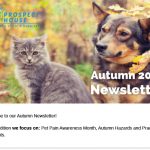Puppy Care
 Getting a new puppy is a very exciting event but can also be challenging. This information sheet gives guidance on important considerations for your puppy to help them grow up happy and healthy in their new family.
Getting a new puppy is a very exciting event but can also be challenging. This information sheet gives guidance on important considerations for your puppy to help them grow up happy and healthy in their new family.
Download our New Puppy Advice Sheet
Choosing a Puppy
 With so many different breeds and types of dog it can be hard to decide which will suit you best. It is worth considering adult size, temperament and amount of exercise required before choosing a puppy.
With so many different breeds and types of dog it can be hard to decide which will suit you best. It is worth considering adult size, temperament and amount of exercise required before choosing a puppy.
Equally important is choosing the breeder or home that they come from. If possible go and visit the puppies first and ask to meet their mother so you can see her temperament.
It is also useful to ask the breeder for any information on worming, feeding and vaccinations so far.
Bringing your Puppy home
Make sure they have a bed to make their own where they can feel safe. Crates/cages can be good for this. A blanket brought from the breeder and pheromone sprays, such as DAP, can help them feel more comfortable in their new bed. Introduce new people and other family pets gradually.
Socialisation
This makes their first few weeks in their new home very important in preparing them for adult life. Try to introduce them to different people and other dogs. Once they are vaccinated puppy training classes can be great for socialisation. It is also worth getting them used to different environments, including the vets, traffic noise and travelling in the car.
There are CD’s available to desensitise dogs to loud noises, such as fireworks, which can help to avoid fear of these in later life. Getting your puppy used to being handled at a young age will help you deal with them later in life, for example examining their ears, teeth and feet and grooming them. Rewards can be very useful when introducing your puppy to new things, but remember to reward them when they start to relax rather than when they are very anxious otherwise they can learn that fearful behaviour is a good thing.
We have copies of a book on puppy behaviour and development available for further advice.
Our vet Kat is also available for Behaviour consultations for any specific concerns regarding your puppy, please get in touch with reception to find out how to book these.
Vaccination
Luckily we do not see these diseases very commonly any more but that is only due to vaccination now being widespread. Unvaccinated dogs are at risk of serious illness.
The usual vaccination course involves two or three injections over a 4 week period, starting from 8 weeks of age. Immunity from these is not instant and so we advise that you avoid contact with unvaccinated dogs until 1 week after the second vaccination, including avoiding any areas where unvaccinated dogs may go such as parks, public roads and the beach. Mostly this means puppies are best kept inside or in an enclosed garden.
Carrying them around, if this is practical, or using a pram can be useful for socialising them during this period. As coming to a new home can be a stressful event we usually advise waiting for puppies to settle in their new home for a couple of days before bringing them in for vaccination.
A first visit to the vets also gives us a chance to give your puppy a health check. As many puppies may have received part of their vaccination course from the breeder please bring any certificates with you. We can then work out the best vaccination schedule for your puppy.
The World Small Animal Veterinary Association has recently provided information to suggest that this primary vaccination course may not provide a long lasting immunity in a small proportion of puppies.
This is thought to be due to antibodies passed to them from their mother lasting longer and counteracting the effect of the vaccine. As it is hard to tell which puppies may be affected by this we no recommend that they all have an extra vaccination at 16 weeks of age. This ensures that the protection from their primary vaccinations will last until their first yearly booster.
This does not delay socialisation as they are still able to go out and about from a week after their second vaccination as discussed above.
After their primary course your dog will need boosters annually, for which you should receive a reminder by text message or email.
There has been concern in the past about excessive vaccination of animals. For this reason your dog will not receive vaccination against all the above diseases every year. Immunity from Leptospirosis only lasts a year so this is important as an annual booster. Distemper, ICH and Parvovirus vaccinations give protection for three years so will be given at your dog’s first booster vaccination and then every three years after that.
Annual booster vaccinations also provide a valuable opportunity for us to give your dog a general health check
Leptospirosis Vaccination
The primary injections for this part of the puppy vaccinations must be 4 weeks apart.
Kennel Cough
This is a disease which can cause a nasty harsh cough and raised temperature and in some rare cases can progress to bronchopneumonia.
Despite the name this is not a disease your dog can only get from the Kennels. It is spread by nose to nose contact and inhaling particles from infected dogs so can be acquired from Kennels, training classes and close contact with other dogs in parks etc. We advise that dogs in these risk groups are vaccinated annually against the disease.
Although when exposed to the disease vaccinated dogs can sometimes develop a mild cough they will be protected from the more severe forms of Kennel Cough.
As this is a live vaccine we advise that people with a severely reduced immune system (those on strong medication to suppress their immune system or chemotherapy) do not have nose to nose contact with dogs for 6weeks after the vaccine
Worming
In some areas of the country, including North West England, cases of lungworm have been seen. As part of the lungworm life cycle involves snails we advise monthly preventative treatment for dogs that regularly eat snails or grass.
We are happy to advise on the best wormer for your dog. As they are dosed on a weight basis it is useful to bring your dog in to be weighed at the time or weigh them at home and write it down for us.
Fleas
The majority of this life-cycle is in carpets, bedding etc making it more difficult to deal with. We advise you treat your pets regularly to prevent fleas becoming established in your home and on your animals.
A variety of products are available (Bravecto, Vectra, Effipro, Stronghold, Prinovox) as a spot on applied to the skin on the back of the neck. Bravecto is also available as a tasty tablet and provides 12 weeks protection from both fleas and ticks.
Feeding
Any imbalances in their diet now can have long lasting effects into their adult life. If they have come to you with a diet from the breeder which you feel needs changing then do this gradually over a week or two.
The amount of food needed will vary with the individual but a guide can be found on the back of the bag, usually based on the adult bodyweight you expect your dog to reach. We can check if this amount of food is right for your puppy by monitoring their weight. This is particularly important for large breed dogs (see later).
Most puppies will need three meals a day till 6 months old, which can later be reduced to one or two meals. Small and toy breeds will usually need two meals a day as adults to prevent their blood sugar levels going to low.
Large Breed Dogs
Genetics have a role which is why the parents of your large breed puppy may have been scored for certain joints.
This means that x-rays have been taken and analysed to see if the parents have good joints and so are less likely to pass on joint problems to their puppies.
Rate of growth is a very important factor which can be controlled by you as a new owner. Growing too quickly will put joints under more strain and lead to problems later in life. Feeding a good quality puppy food, ideally specifically designed for large breed puppies, and monitoring their weight are important.
When we see a new large breed puppy we will usually make a growth chart to plot their weight up to 20 weeks old, comparing it with maximum, minimum and average growth for their breed. This allows you to make adjustments to the amount of food they are given. Many puppy diets will advise that large breed dogs change to a ‘junior’ food at around 6months to prevent excessive growth rate.
Exercise needs to be controlled until your large breed dog is mature (up to 18 months old for some giant breeds), to prevent extra strain on growing joints.
This means gradually building up the amount and intensity of their exercise and avoiding major hill walking etc until they are an adult.
Neutering
The advantages include :-
• Not having to manage your bitch when in season
• Prevents litters of unwanted puppies
• Removal of ovaries prevents ovarian cancers and reduces risk of mammary tumours (when done before 4th season)
• Prevents uterine infection (pyometra) which can be life threatening and require spaying at greater risk in a sick patient
Even if you want a litter of puppies first they can still be spayed after this and have some of the above benefits. One disadvantage of spaying can be the development of slight urinary incontinence later on in life, but this is usually easily managed with medications
Males – Neutering or castration involves an operation to remove the testicles and is usually done from 9months of age in small/medium breeds or from 12 months in large breeds. The advantages include :-
• Prevents litters of unwanted puppies
• Less testosterone related aggression towards other male dogs
• Less likely to stray after female dogs
• Prevents testicular tumours
• Reduces prostate problems later on in life
For more detailed information on timing of neutering please see our Neutering advice handout.
Microchipping
We can do this from any age but usually we will insert them at their second vaccination or at a subsequent visit.
Your dog, whether microchipped or not, is still required by law to have a collar identification tag with your contact details on.
Pet Healthcare Club
It includes yearly booster vaccinations, year round flea and worm control, nail clipping, microchipping and a six monthly health check.
Pets in our Pet Healthcare club also benefit from a 10% discount on dentistry, food and neutering. For more information please speak to one of our staff.
Insurance
We can help you take out a four week free policy with Petplan to make sure they are covered from the earliest opportunity.





